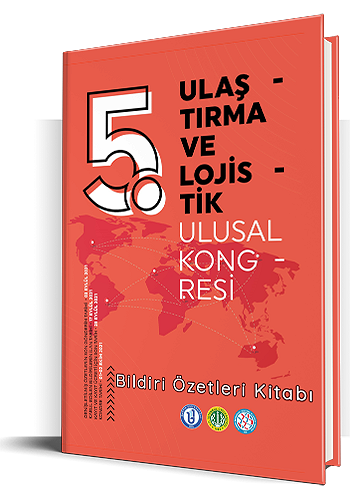
Ulaştırma ve Lojistik Kongreleri
- Türkçe
- Özet
- 2021
Lojistik Sektörünün OECD Ülkelerinin Dış Ticaret ve Ekonomik Büyüme Performansları Üzerindeki Etkileri
Selim Kayhan
Prof. Dr., Necmettin Erbakan Üniversitesi, Konya, Türkiye
Mehmet Şentürk
Prof. Dr., Kilis 7 Aralık Üniversitesi, Kilis, Türkiye
Tayfur Bayat
Prof. Dr., Hebei Teknoloji Üniversitesi, Malatya, Türkiye
Ekonomik büyüme özellikle gelişmemiş ve gelişmekte olan ülkeler tarafından uygulanan ekonomi politikalarının birincil hedefleri arasında yer almaktadır. Bu bağlamda ülke yönetimleri yüksek büyüme hızlarına ulaşarak gelişmiş ülkelerin refah düzeyine bir an önce ulaşmak için farklı politika stratejileri uygulamaktadırlar. Bu politika stratejileri içerisindeki vazgeçilmez alt başlıklardan bir tanesi dış ticaret politikalarıdır. Açık ekonomi ya da daha geniş tanımıyla kapitalist ekonomik sistemi benimseyen ülkelerde ihracat yapmak suretiyle yurtiçi üretimi artırmak ve bu sayede gerek istihdamı artırarak kaynakların daha etkin kullanılmasını hem de daha fazla katma değer üretmek yoluyla ekonomik büyümeyi sağlama amacına yönelmişlerdir. Ekonomik büyüme için sadece ihracatın elzem olduğunu söylemek de yanlış olacaktır. Zira, özellikle ihracat için yapılan üretimde kullanılan hammadde, yarı mamul ve makine – teçhizatı için dışa bağımlı olan, bir başka deyişle yapılan ihracatın ithal edilen ürünlere bağımlı olan ülkelerde yapılan ithalatın hacmi de önem arz etmektedir. Tüm bu açıklamalar ışığında bir ülkenin ithalatının ve ihracatının artması ekonomik büyüme için önemli olduğunu söylemek mümkündür. Bu bağlamda önemli bir diğer konu da ihracat amacı ile üretilen ürünün ilgili destinasyona taşınması, üretim için gerekli hammadde ve benzeri metanın da ülke içerisine ilgili destinasyondan getirilmesidir. Lojistik olarak adlandırılan ve çok detaylı bir işlem ağından oluşan ülkeden ürünün çıkışı ve girişi işlemleri ülkenin ekonomik performansı açısından büyük önem arz etmektedir. Zira etkin bir şekilde çalışmayan lojistik sistemi firmaların ihracat yapması için gerekli altyapıyı sunamayacağından ihracat artışını engelleyecek, gelişmemiş lojistik süreci maliyetleri arttıracağından ihracat fiyatlarının yukarı doğru etkilenmesini sağlayacaktır. Yukarıdaki açıklamalar ışığında lojistik sektörünün gelişmişliği ile dış ticaret performansı arasında doğru orantılı bir ilişkinin olduğunu söylemek mümkündür. Dış ticaret hacmi ile ekonomik büyüme arasında doğru orantılı bir ilişkinin olduğu düşünüldüğünde ekonomik büyüme için de lojistik sektörünün gelişmiş olması gerektiği söylenebilir. Bu çalışmada lojistik sisteminin performansı ile dış ticaret hacmi arasındaki ilişki incelenmektedir. Elde edilen sonuçlar ülkelerin lojistik sektörüne bakış açıları, lojistik sektörü ile ilgili politika kurulumlarına yön verebilecektir. Lojistik sektörü ve dış ticaret hacmi arasındaki ilişki incelenirken ele alınacak örneklem ise OECD ülkeleridir. OECD’nin Türkçe açılımı İktisadi İşbirliği ve Kalkınma Teşkilatıdır. İkinci Dünya Savaşı sonrasında Avrupa ekonomilerinin desteklenmesi ve iyileştirilmesi için 1961 yılında kurulan teşkilat, 20 kurucu üyeye sahip iken ilerleyen yıllarda üye sayısını artırmıştır. Kuruluş amacı gereği üye ülke ekonomilerinin kalkınmışlık seviyelerini yükseltmeyi hedefleyen teşkilat nihayetinde üye ülkelerin refah seviyesini artırmayı amaçlamaktadır. OECD’ye üye seçili ülkelerin 2007 – 2018 yıllarına ait lojistik performans endeksi verilerinin lojistik sektörünün bir ölçütü olarak kullanıldığı analizde, ihracat ve ithalat tutarlarının GSYİH’ye oranları ve kontrol değişkeni olarak da kişi başına düşen GSYİH değişkenleri kullanılmaktadır. Analiz yöntemi olarak Panel veri analiz yöntemi kullanılmaktadır. Yeterli zaman serisi uzunluğunun olmadığı durumlarda ülke gruplarının verilerinin grup olarak değerlendirildiği panel veri analiz yöntemlerinde uygulama sonuçları ülke grubunu bir bütün olarak değerlendirmektedir. Son yıllarda geliştirilen panel veri yöntemleri hem ülke grubu hem de ülke bazlı sonuçlar da sunmaktadır. Bu bağlamda bu çalışmada öncelikle ülkeler arasında yatay kesit bağımlılığının olup olmadığı test edilecek, bağımlılığının olup olmamasına göre uygun panel birim kök testleri uygulanacaktır. Sonrasında panel eş-bütünleşme testleri uygulanacak ve son olarak da Köse ve Emirmahmutoğlu (2013) tarafından geliştirilen ve ülke bazında sonuçlar sunan panel nedensellik yöntemi kullanılmaktadır. Elde edilen bulgular göstermektedir ki, seçili OECD ülkelerinde lojistik sektöründeki gelişmelerin ihracat ve ithalata katkısı sınırlıdır. Yani lojistik sektöründeki bir değişim ihracatın artmasına herhangi bir katkısı bulunmaktadır. Bu sonucun temelinde OECD ülkelerin ihracat yapısı ya da rekabetçi yapıdaki farklılıklar bulunabilir.
Anahtar Kelimeler: Lojistik Performansı, OECD Ülkeleri, Panel Veri
The Effects of the Logistics Sector on the Foreign Trade and Economic Growth Performances of OECD Countries
Economic growth is among the primary objectives of the economic policies implemented by especially underdeveloped and developing countries. In this context, country governments are implementing different policy strategies in order to reach the welfare level of developed countries as soon as possible by reaching high growth rates. One of the indispensable sub-titles in these policy strategies is foreign trade policies. In countries that adopt the open economy, or in its broader definition, the capitalist economic system, they have tended to increase domestic production by exporting, thus increasing employment and using resources more effectively, as well as providing economic growth by producing more added value. It would also be wrong to say that only exports are essential for economic growth. Because, the volume of imports made in countries that are import-dependent especially for raw materials, semi-finished products and machinery-equipment used in production for export, in other words, the volume of imports made in countries where exports are dependent on imported products is also important. In the light of all these explanations, it is possible to say that an increase in both imports and exports of the country is important for economic growth. Another important issue in this context is to transport the product produced for export to the relevant destination, and to bring the raw materials and similar commodities required for production into the country from the relevant destination. The exit and entry of the product from the country, which is called logistics and consists of a very detailed transaction network, is of great importance for the economic performance of the country. Because the logistics system that does not work effectively will not be able to provide the necessary infrastructure for the companies to export, it will prevent the increase in exports, and since the underdeveloped logistics process will increase the costs, it will affect the export prices upwards. In the light of the above explanations, it is possible to say that there is a directly proportional relationship between the development of the logistics sector and foreign trade performance. Considering that there is a directly proportional relationship between foreign trade volume and economic growth, it can be said that the logistics sector should be developed for economic growth. In this study, the relationship between the performance of the logistics system and the foreign trade volume is examined. The results obtained will be able to guide the countries' perspectives on the logistics sector and their policy setups related to the logistics sector. While examining the relationship between the logistics sector and foreign trade volume, the sample to be considered is Organization for Economic Cooperation and Development (hereafter, OECD) countries. The organization, which was established in 1961 to support and improve European economies after the Second World War, had 20 founding members and increased the number of members in the following years. The organization, which aims to increase the level of development of the member countries' economies due to its establishment purpose, ultimately aims to increase the welfare level of the member countries. In the analysis, in which the logistics performance index data of selected OECD member countries from 2007 to 2018 are used as a measure of the logistics sector, the ratios of export and import amounts to GDP and per capita GDP variables are used as control variables. Panel data analysis method is used as the analysis method. In panel data analysis methods, where the data of the country groups are evaluated as a group in cases where there is not enough time series length, the application results evaluate the country group as a whole. Panel data methods developed in recent years provide both country group and country-based results. In this context, in this study, first of all, it will be tested whether there is a cross-sectional dependence between countries, and appropriate panel unit root tests will be applied according to whether there is a dependency or not. Afterwards, panel co-integration tests will be applied, and finally, the panel causality method, which was developed by Köse and Emirmahmutoğlu (2013) and provides results on a country basis, is used. The findings show that the contribution of the developments in the logistics sector to exports and imports is limited in selected OECD countries. In other words, a change in the logistics sector has any contribution to the increase in exports. The basis of this result may be differences in the export structure or competitive structure of OECD countries.
Keywords: Panel Data, OECD Countries, Logistic Performance


Bu çalışma, kullanan kişilere orjinal çalışmadan alıntı yaptıkları sürece, çalışmayı dağıtma, değiştirme ve üzerine çalışma hakkı tanıyan Attribution 4.0 International (CC BY 4.0) lisansı ile lisanslanmıştır.
İletişim
İstanbul Üniversitesi Ulaştırma ve Lojistik Fakültesi
İ.Ü. Avcılar Kampüsü 34320 Avcılar/İstanbul
ulk@istanbul.edu.tr
+ 90 (212) 440 00 00 - 19200


